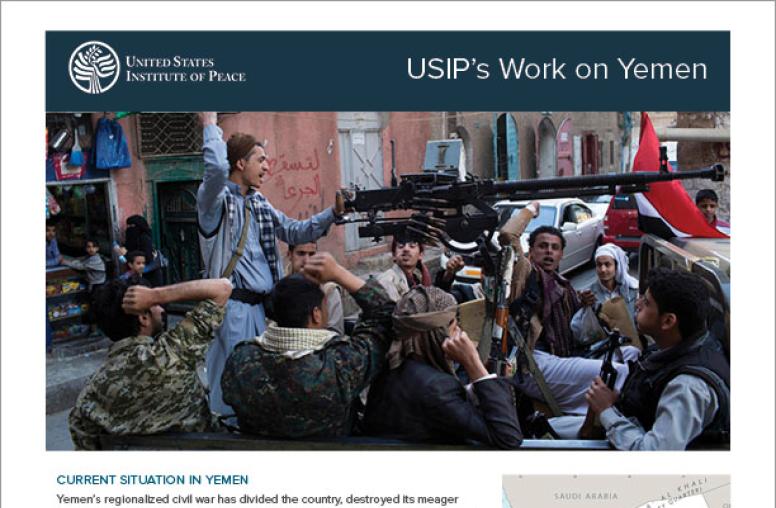Justice and Security Dialogue in Yemen
Negotiating Local Sources of Conflict amid National Transition
This report discusses the Justice and Security Dialogue (JSD) processes and activities which took place in the governorates of Abyan and Marib from early 2013 through early 2014. It details the research, planning, and implementation of context-driven dialogues, including outcomes, conclusions, and lessons learned.
Problem Identified
- In the wake of the collapse of state control in parts of Yemen during the 2011 Arab Spring crisis, local security and justice systems were in disarray, and local communities lacked confidence that local government actors, who had been impotent in the face of militant and criminal actions in 2011, could restore those systems.
- Local government actors needed support and top-down decision making from the national government if they were to kickstart local change. The transitional government and the main political parties and actors, however, were absorbed by debates on a national political settlement.
Action Taken
- USIP explored whether a Justice and Security Dialogue (JSD) program, a tool USIP has used successfully to empower collective local security problem-solving, could help mitigate lingering justice and security issues.
- USIP introduced pilot JSDs in two governorates, Abyan and Marib, which suffered from weak state control, needed significant reconstruction and development, and had to contend with a high presence of transnational terrorist groups and criminal networks.
- The JSDs brought together local state officials, tribesmen, and community representatives to begin brainstorming local solutions. The JSD further empowered participants by linking select local representatives with national-level policymakers and actors who might be able to support local initiatives.
Lessons Learned
- JSDs may be helpful in other governorates in Yemen, offering an important opportunity for further developing reform proposals that have emerged in this transition period and applying them successfully at the local level. Connecting local actors with national-level officials and policymakers was an important component of the Yemen JSDs, given the dynamic changes happening at a national level during this transition period. Success at the national level also often fueled greater cooperation and problem-solving at a local level.
- While JSDs offer one potential avenue for addressing the breakdown between national and local politics and contributing positively to political transition, the ongoing political uncertainty and the high number of security and governance challenges in Yemen make JSD activities difficult to carry out. These conditions may complicate timelines and make progress harder to achieve, requiring greater time and flexibility to achieve JSD goals.
- Local JSD initiatives were more successful when complemented by outside or national-level support, ranging from a national policy decision that supported local initiatives to funding for local infrastructure. These were perceived as concrete results from the dialogue, a perception that generated more buy-in from the communities and further cooperation.
About the Report
The Building Peace series reports on innovative work by USIP that has practical applications for peacemakers and peacebuilders. The goal is to get useful knowledge into the hands of practitioners promptly. Some of the work reported in Building Peace is recent, some is ongoing. All of it has been tested, usually in the field, but this is work in progress and feedback is warmly welcomed. Please send all comments on this report to Colette Rausch, the acting vice president for Governance, Law & Society and director of the Rule of Law Center, at crausch@usip.org.



